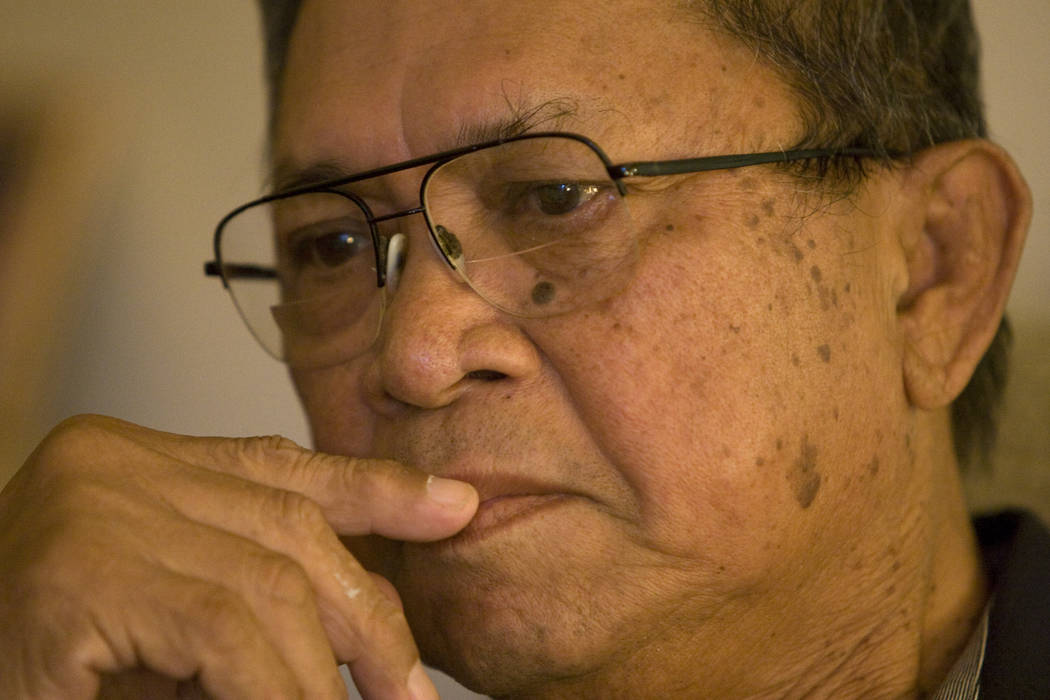The effects of a killer doctor still remain in Las Vegas

The doctor who arrived in Las Vegas in 1980 became known in medical circles simply as “D.”
And until a February 2008 news conference where it was announced that tens of thousands of patients at his clinics would have to be tested for hepatitis C and HIV, Dr. Dipak Desai remained basically unknown to the general public.
A man who examines polyps and hemorrhoids for a living doesn’t generate much news.
But today there’s no question he’s the best-known physician to have practiced in Southern Nevada.
So it goes when the global media reports he deliberately set up an assembly-line colonoscopy system devoid of infection controls to save money — one where the reuse of syringes and single-dose vials of medicine ultimately killed two people, terribly sickened more than 100 others, and generated fear in thousands more.
After he died of a stroke last Monday in a Reno hospital — he was transferred there from state prison where he was serving a life sentence for his 2013 murder conviction and 27 other charges related to his practice — it’s impossible not to reflect on the life of a man who exhibited no signs of conscience once he was in the public eye.
He lived in a $3.4 million home at Red Rock Country Club. When golfers teed off on the 14th hole, they were clearly visible from the huge back window dominating the physician’s 8,700-square-foot house on a hill.
It was not a view the immigrant from India appreciated, according to a longtime acquaintance.
“He doesn’t like golf,” the retired engineer told me in 2008. “He thinks it’s a waste of time. I’ve never seen him play it or watch it. Basically, all he’s interested in is making money. He just lives on a golf course for the status.
“He’s not that hard to figure out.”
To this day, according to former Desai patient Patty Aspinwall, the engineer’s observation affords the best insight into the physician who would brag to colleagues that he came here with nothing and amassed a $200 million fortune.
Now cured of hepatitis, she says Desai’s obsession with material status makes it easy to understand why biopsy forceps and bite blocks were also reused, lubricating jelly was rationed, and sheets and medical gowns weren’t changed between patients given worthless and dangerous two-minute colonoscopies.
Desai’s sociopathic greed — former Las Vegas physician Charles Cohan tried unsuccessfully in the ’90s to get regulators to take action against him for billing insurance carriers for bogus-yet-dangerous procedures — didn’t just hurt his patients.
Even after the city of Las Vegas shut down Desai’s office in 2008 — the state medical board where Desai once headed the investigative committee refused to do it — the lives of thousands of Southern Nevadans were imperiled.
“They’re afraid of getting what can be life-saving colonoscopies,” Dr. Frank Nemec noted.
That fear hasn’t been entirely muted by Desai’s death because of the fact that 13 doctors who worked for Desai still can practice in Las Vegas.
Nemec has played a key role in a national Centers for Disease Control and Prevention safe injection practices campaign spawned by the Las Vegas outbreak.
But it was too late for Col. Rodolfo Meana, who died in 2012 from hepatitis C acquired five years earlier at Desai’s clinic. A Filipino war hero wounded by Islamic terrorists, he told me often before his death that he immigrated to America to be safe. Repeatedly he asked a question that should never have to be asked.
“What kind of doctors and nurses would take chances with other people’s lives?”
Paul Harasim’s column runs Sunday and Tuesday in the Nevada section and Monday in the Health section. Contact him at pharasim@reviewjournal.com or 702-387-5273. Follow @paulharasim on Twitter